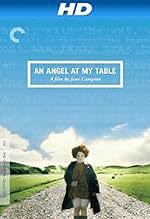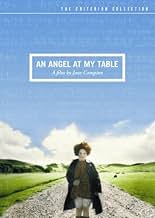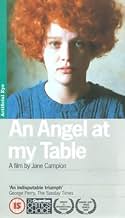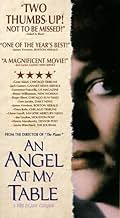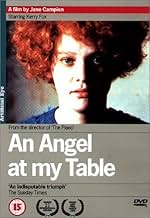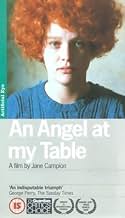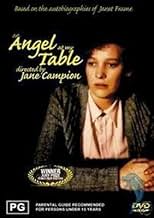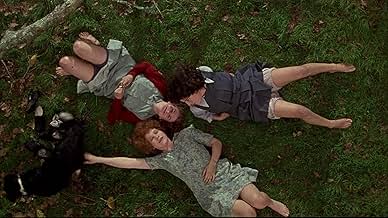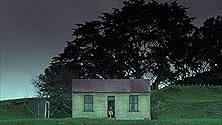IMDb RATING
7.4/10
9.2K
YOUR RATING
Janet Frame was a brilliant child who, as a teen, was misdiagnosed with schizophrenia. Explore Janet's discovery of the world and her life in Europe as her books are published to acclaim.Janet Frame was a brilliant child who, as a teen, was misdiagnosed with schizophrenia. Explore Janet's discovery of the world and her life in Europe as her books are published to acclaim.Janet Frame was a brilliant child who, as a teen, was misdiagnosed with schizophrenia. Explore Janet's discovery of the world and her life in Europe as her books are published to acclaim.
- Awards
- 19 wins & 5 nominations total
Kevin J. Wilson
- Father
- (as K.J. Wilson)
- Director
- Writers
- All cast & crew
- Production, box office & more at IMDbPro
Featured reviews
Superficially, this is a sort of "My Brilliant Career," meets "A Beautiful Mind."
It features one of the most extraordinary actresses, new to me. I saw her in "Intmacy" and had to find more. It is made by a talented and sometimes engaging filmmaker who explores how women are haunted. It is about a writer whose books don't grab me, but whose story does. She believed herself haunted.
The problem is that these three songs from different souls don't overlap that much.
Frame created written images that were teased out of a struggle with life, one that infused her. Her sanity came from the writing. She didn't write about insanity and marginalization, she wrote from them to counter and co-opt them somewhat. This engages the reader because most of us are afraid to go as deeply into the darkness as these visions indicate.
That's a different thing entirely than the story Campion has chosen to give us, which is about all the external agency that surrounded her. I cannot think of an instance where the literary kite and the cinematic string are in such different dimensions. Sure, its an interesting story that someone's light survived, I suppose. But we never see that light, or the ledges that were climbed, or the images that were carried out for us.
What's left for Fox to do is emote visually. She does an extraordinary job, quite apart from the fact that it is ineffective in this container. I really do think she's something another of those Australian/New Zealand crowd that just seem to have something that is rare elsewhere.
She and the girls who play her younger selves are redheads. That's not at all a cinematic device, though it is used cleverly to mend the three actresses. Frame actually had that Clarabelle hair.
Ted's Evaluation -- 2 of 3: Has some interesting elements.
It features one of the most extraordinary actresses, new to me. I saw her in "Intmacy" and had to find more. It is made by a talented and sometimes engaging filmmaker who explores how women are haunted. It is about a writer whose books don't grab me, but whose story does. She believed herself haunted.
The problem is that these three songs from different souls don't overlap that much.
Frame created written images that were teased out of a struggle with life, one that infused her. Her sanity came from the writing. She didn't write about insanity and marginalization, she wrote from them to counter and co-opt them somewhat. This engages the reader because most of us are afraid to go as deeply into the darkness as these visions indicate.
That's a different thing entirely than the story Campion has chosen to give us, which is about all the external agency that surrounded her. I cannot think of an instance where the literary kite and the cinematic string are in such different dimensions. Sure, its an interesting story that someone's light survived, I suppose. But we never see that light, or the ledges that were climbed, or the images that were carried out for us.
What's left for Fox to do is emote visually. She does an extraordinary job, quite apart from the fact that it is ineffective in this container. I really do think she's something another of those Australian/New Zealand crowd that just seem to have something that is rare elsewhere.
She and the girls who play her younger selves are redheads. That's not at all a cinematic device, though it is used cleverly to mend the three actresses. Frame actually had that Clarabelle hair.
Ted's Evaluation -- 2 of 3: Has some interesting elements.
An Angel at My Table tells the story of famed New Zealand author Janet Frame. We are drawn into the quiet world of the shy, red-haired girl who struggles with her life, but succeeds through her exceptional talent of writing. Since her autobiography was written in three separate volumes, we are treated to a film in three separate parts, beginning with her journey through childhood. The film does an excellent job at portraying the character of Frame, and her nervous attitude when brought into social situations. Every ounce of shyness is felt off-screen, which is a kudos to the direction of Campion, that plays an important part in making sure that this woman is brought to life, as realistic, and as close to the truth as possible.
Growing up in poverty, with two hard-working parents, and 4 siblings, life must've been hard. But when you're thrust into such a difficult situation, it somehow seems normal and it doesn't bother that it's a much harder life than other people currently living are. But Janet lived through her childhood, finding that she would love to spend her life as a poet, or just writing. A depression hit her hard during her teenage years when an unexpected tragedy occurred, and she had chosen to write, instead of being with that person beforehand. Not knowing she was a depressed young person, Frame was sent to a mental hospital, and forced to undergo several shock treatments, under the incorrect diagnosis of schizophrenia. However, Frame persevered through it, using writing as a way of expressing her own thoughts. While still in the mental hospital, she was able to publish a book. The years inside the hospital are the most unpleasant of film, and Campion perfectly captures the deranged conditions that Janet experienced. The most remarkable part about the direction is how it doesn't go over the top to deliver a nauseating film in those scenes. Rather, she plays to the quiet personality of Frame. The film is kept with the same pace, and focused in a way that never wants to show itself off, but keeps the main character always in the center, without losing that focus.
The blown-up biopic `Malcolm X' was released around a year later, and while I admire that film, it was also very hyped-up before it's release. I found a strange drawing power in the fact that Jane Campion's film wasn't about spectacle, but about someone's life that is done more sincerely, and realistically, paying close attention to details, both period and human. Something you wouldn't find in a Hollywood biopic, such as Milos Foreman's `Man on the Moon,' which I openly despise.
The writer and director surprised me a bit concerning a small detail in the film. In films concerning `writing', and an exceptional author (Wonder Boys, Finding Forrester), there is never any real proof of how good the writer supposedly is. We are never allowed to read the great book they wrote, nor are there much of any excerpts written to prove to us that the writer is indeed as great as it is suggested. In films, I realize that it really isn't possible to show such a thing, since film is a visual medium instead of a literary one. Campion and the screenwriter know this, and without subjecting us to Frame's writing, she adds in some narration, using actress Kerry Fox's voice. The narration is spread out in small bits throughout the film, never taking control of telling the story. Instead, it conveys the thoughts going on in Frame's mind, which are all little excerpts from the writing contained in her autobiographies. It begins with narration and ends with it. A surprising detail that is small, but adds much to the overall film, and gives the ending a sweet, and optimistic touch to an amazing film.
Frame was (is) talented at what she did most of the time, without knowing the talent was there. She only knew that she loved to do it, and wanted to continue doing it for the rest of her life. That is true talent. She had it, even at times when she thought there wasn't any hope; she had the ability to write. And because of that ability, that talent, she was able to gradually come to terms, and live comfortably with her life. ****1/2 of five or (9/10)
Growing up in poverty, with two hard-working parents, and 4 siblings, life must've been hard. But when you're thrust into such a difficult situation, it somehow seems normal and it doesn't bother that it's a much harder life than other people currently living are. But Janet lived through her childhood, finding that she would love to spend her life as a poet, or just writing. A depression hit her hard during her teenage years when an unexpected tragedy occurred, and she had chosen to write, instead of being with that person beforehand. Not knowing she was a depressed young person, Frame was sent to a mental hospital, and forced to undergo several shock treatments, under the incorrect diagnosis of schizophrenia. However, Frame persevered through it, using writing as a way of expressing her own thoughts. While still in the mental hospital, she was able to publish a book. The years inside the hospital are the most unpleasant of film, and Campion perfectly captures the deranged conditions that Janet experienced. The most remarkable part about the direction is how it doesn't go over the top to deliver a nauseating film in those scenes. Rather, she plays to the quiet personality of Frame. The film is kept with the same pace, and focused in a way that never wants to show itself off, but keeps the main character always in the center, without losing that focus.
The blown-up biopic `Malcolm X' was released around a year later, and while I admire that film, it was also very hyped-up before it's release. I found a strange drawing power in the fact that Jane Campion's film wasn't about spectacle, but about someone's life that is done more sincerely, and realistically, paying close attention to details, both period and human. Something you wouldn't find in a Hollywood biopic, such as Milos Foreman's `Man on the Moon,' which I openly despise.
The writer and director surprised me a bit concerning a small detail in the film. In films concerning `writing', and an exceptional author (Wonder Boys, Finding Forrester), there is never any real proof of how good the writer supposedly is. We are never allowed to read the great book they wrote, nor are there much of any excerpts written to prove to us that the writer is indeed as great as it is suggested. In films, I realize that it really isn't possible to show such a thing, since film is a visual medium instead of a literary one. Campion and the screenwriter know this, and without subjecting us to Frame's writing, she adds in some narration, using actress Kerry Fox's voice. The narration is spread out in small bits throughout the film, never taking control of telling the story. Instead, it conveys the thoughts going on in Frame's mind, which are all little excerpts from the writing contained in her autobiographies. It begins with narration and ends with it. A surprising detail that is small, but adds much to the overall film, and gives the ending a sweet, and optimistic touch to an amazing film.
Frame was (is) talented at what she did most of the time, without knowing the talent was there. She only knew that she loved to do it, and wanted to continue doing it for the rest of her life. That is true talent. She had it, even at times when she thought there wasn't any hope; she had the ability to write. And because of that ability, that talent, she was able to gradually come to terms, and live comfortably with her life. ****1/2 of five or (9/10)
For some people, "An Angel At My Table' would be a VERY long sit-through. The story of one of New Zealand's most famous authors, who succeeds despite having gone through schizophrenia isn't exactly family entertainment. But although the movie runs far too long, at 2 and a half hours, I found myself engaged quite a bit as soon as the story got moving, and not a relentless character study. Janette Frame, a girl with a serious shock of red hair, grows up, realizing her passion for writing, and suffers tremendous setbacks, both emotionally and professionally. What a performance the three actresses give as Janette, we see Janette as a young girl, a teenager, and as a young adult. Although Kerry Fox is the most well known of all three, all three are tremendous here, each taking the nuances of Frame, and developing the character beautifully. As per the case of all Jane Campion's films, she knows how to frame the camera quite well, and again, although the movie IS long, it does have a lot of amazing little moments
It's a biography of New Zealand author Janet Frame played by three different actresses over her life. She was born in 1924. Her large family is relatively poor. She's a chubby sensitive kid with big wild red hair. As a young teacher (Kerry Fox), she has an emotional breakdown and spends time in a mental hospital. She is diagnosed a schizophrenic. With her mother's approval, she is admitted to a mental hospital for over 8 years where she is subjected to 200 shock treatments barely escaping brain surgery.
This is an interesting portrait of a life. It isn't that dramatic except for the hospital section. It's more a series of events where a nervous Janet is belittled and overlooked. It doesn't fit the traditional three act play structure. It's a simple straight time line of events. Jane Campion uses her style of directing. It's natural and confident. A more standard biopic would concentrate on the 8 year hospital stay making a drama out of it. Instead, this way is a more humanistic way of showing a life. Kerry Fox is terrific and the little girl has an unforgettable look.
This is an interesting portrait of a life. It isn't that dramatic except for the hospital section. It's more a series of events where a nervous Janet is belittled and overlooked. It doesn't fit the traditional three act play structure. It's a simple straight time line of events. Jane Campion uses her style of directing. It's natural and confident. A more standard biopic would concentrate on the 8 year hospital stay making a drama out of it. Instead, this way is a more humanistic way of showing a life. Kerry Fox is terrific and the little girl has an unforgettable look.
I think this film is another fine example of Kiwi talent! Some incredibly original literature, film, television, and acting talent originates from the island nation of New Zealand. "An Angel At My Table" is one of the great examples. The first time I saw this film (or tele-film) I was left emotionally affected by Janet Frame's life. I could not believe how easy it was for someone to be treated the way she was just because she was shy, socially awkward and had curly, red hair. How times have changed! Nowadays if you are not a freak ... you are a freak! It is scary to think how easy it was, apparently at that time, for a person to be thrown into a madhouse. Not to mention the deplorable conditions of those types of institutions.
Initially, I felt sorry for Ms. Frame but then I realized she probably has had a fuller life than I have had (or probably ever will). She has accomplished so much and given pleasure to the many who have read her stories and poetry. Watching this film has prompted me to begin looking for her writings since I have been so intrigued by her story. I was glad to see that by the end of the movie she had begun to become comfortable with herself and open her shell. Biographical information on Ms. Frame seems sketchy. I have not found much information about her life after the period where the film ended.
Thank you Jane Campion for another wonderful character driven film (albeit a real-life character this time)! The only real criticism I have of the film is the portrayal of Frame's time in the institution. While the film did not make it pretty nor gloss over the situation in general, sources I have read indicate Janet was dangerously close to receiving an operation that seems similar to a lobotomy. The operation, if performed, would have left Janet an emotionless, child-like creature and was not adequately depicted. But for the grace of her publication, she was saved.
Initially, I felt sorry for Ms. Frame but then I realized she probably has had a fuller life than I have had (or probably ever will). She has accomplished so much and given pleasure to the many who have read her stories and poetry. Watching this film has prompted me to begin looking for her writings since I have been so intrigued by her story. I was glad to see that by the end of the movie she had begun to become comfortable with herself and open her shell. Biographical information on Ms. Frame seems sketchy. I have not found much information about her life after the period where the film ended.
Thank you Jane Campion for another wonderful character driven film (albeit a real-life character this time)! The only real criticism I have of the film is the portrayal of Frame's time in the institution. While the film did not make it pretty nor gloss over the situation in general, sources I have read indicate Janet was dangerously close to receiving an operation that seems similar to a lobotomy. The operation, if performed, would have left Janet an emotionless, child-like creature and was not adequately depicted. But for the grace of her publication, she was saved.
Did you know
- GoofsThe streets of Ibiza have some features that surely were not present on the 50s, i.e., a "no parking" signal on one of the streets. Cars were very rare on the island those days.
- SoundtracksSomebody Stole My Gal
Written by Leo Wood
Performed by Pat McMinn with Crombie Murdoch and the Nickelodeons
Used by permission of D.F. Peach
- How long is An Angel at My Table?Powered by Alexa
Details
- Release date
- Countries of origin
- Languages
- Also known as
- Un ángel en mi mesa
- Filming locations
- Production companies
- See more company credits at IMDbPro
Box office
- Gross US & Canada
- $1,054,638
- Opening weekend US & Canada
- $12,905
- May 27, 1991
- Gross worldwide
- $1,055,995
- Runtime2 hours 38 minutes
- Color
- Aspect ratio
- 1.66 : 1
Contribute to this page
Suggest an edit or add missing content



